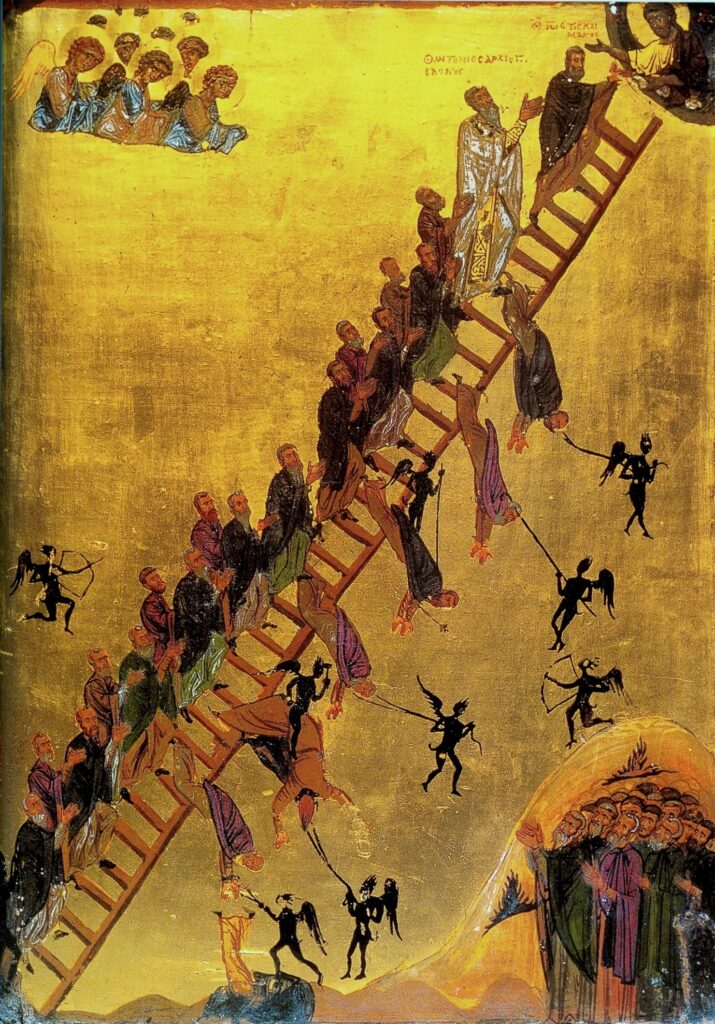
Insensibility and Vainglory
from The Ladder, by St. John of Sinai (Klimakos; 570-659)
STEP 18: “Insensibility (Gk., anaisthesia) is negligence that has become habit, benumbed thought, the child of predispositions, a snare for zeal, the noose of courage, ignorance of compunction, a door to despair, the mother of forgetfulness which gives birth to loss of the fear of God. And then she becomes the daughter of her own daughter (i.e., forgetfulness leads to the loss of the fear of God leading to more insensibility).
“He who has lost sensibility is a witless philosopher, a self-condemned commentator, a self-contradictory windbag, a blind man who teaches others to see. He talks about healing a wound, and does not stop irritating it. He complains of sickness, and does not stop eating what is harmful. He prays against it, and immediately goes and does it. And when he has done it, he is angry with himself; and the wretched man is not ashamed of his own words. ‘I am doing wrong,’ he cries, and eagerly continues to do so. His mouth prays against his passion, and his body struggles for it.
“He philosophizes about death, but he behaves as if he were immortal. He groans over the separation of soul and body, but drowses along as if he were eternal. He talks of temperance and self-control, but he lives for gluttony. He reads about the judgment and beings to smile. He reads about vainglory, and is vainglorious while actually reading. He repeats what he has learned about vigil, and drops asleep on the spot. He praises prayer, but runs from it as from the plague.
“He blesses obedience, but he is the first to disobey. He praises detachment, but he is not ashamed to be spiteful and to fight for a rag. When angered he becomes bitter, and he is angered again at his bitterness; and he does not feel that, after one defeat, he is suffering another. Having overeaten he repents, and a little later again gives way. He blesses silence, and praises it with a spate of words. He teaches meekness, and during the actual teaching frequently gets angry. Having woken from passion he sighs, and shaking his head, he again yields to passion. He condemns laughter, and lectures on mourning with a smile on his face.
“Before others he blames himself for being vainglorious, and in blaming himself is only angling for glory himself. He looks people in the face wit passion, and talks about chastity. While frequenting the world, he praises those who live in stillness without realizing that he shames himself. He extols almsgivers, and reviles beggars. All the time he is his own accuser, and he does not want to come to his senses – I will not say cannot.
“I was astounded at the words of this raving creature (insensibility), and asked her about her father, wishing to know his name, and she said: ‘I have no single parentage; my conception is mixed and vacillating. Satiety nourishes me, times makes me grow, and bad habit entrenches me. He who keeps this habit will never be rid of me. Be constant in vigil, meditating on the eternal judgment; then perhaps I shall to some extent relax my hold on you. Find out what caused me to be born in you, and then battle against my mother; for she is not in all cases the same. Pray often at the coffins, and engrave an indelible image of them in your heart. For unless you inscribe it there with the pen of fasting, you will never conquer me.’”
STEP 22: “With regard to its form, vainglory is a change of nature, a perversion of character, a note of blame. And with regard to its quality, it is a dissipation of labors, a waste of sweat, a betrayal of treasure, a child of unbelief, the precursor of pride, shipwreck in harbor, an ant on the threshing-floor which, though small, has designs upon all one’s labor and fruit. The ant waits from the gathering of the wheat, and vainglory for the gathering of the riches of virtue; for the one loves to steal and the other to squander.
“Observe and you will find unholy vainglory abounding till the very grave in clothes, oils, servants, perfumes, and the like. The sun shines on all alike, and vainglory beams on all activities. For instance, I am vainglorious when I fast; and when I relax the fast in order to be unnoticed, I am again vainglorious over my prudence. When well-dressed I am quite overcome by vainglory, and when I put on poor clothes I am vainglorious again. When I talk I am defeated, and when I am silent I am again defeated by it. However I throw this prickly-pear, a spike stands upright.
“A vainglorious person is a believing idolater; he apparently honors god, but he wants to please not God but men. Every lover of self-display is vainglorious. The fast of the vainglorious person is without reward and his prayer is futile, because he does both for the praise of men.
“God often hides from our eyes even those perfections that we have obtained. But he who praises us or, rather, misleads us, opens our eyes by his praise, and as soon as our eyes are opened, our treasure vanishes.
“Vainglory makes those who are preferred, proud, and those who are slighted, resentful. Vainglory is often the cause of dishonor instead of honor, because it brings great shame to its enraged disciples. Vainglory makes quick-tempered people meek before men. It has great ambition for natural gifts, and through them often hurls its wretched slaves to destruction.
“If we ardently desire to run towards the state of well-being on high, we should be eager to taste the glory that is above. He who has tasted that will despise all earthly glory. For I should be surprised if anyone could despise the latter unless he had tasted the former.
“He who is proud of his natural advantages, I mean cleverness, ability to learn, skill in reading, a clear pronunciation, quick understanding, and all such gifts received by us without labor, will never obtain the supernatural blessings, because he who is unfaithful in a little is also unfaithful and vainglorious in much (cf. Lk. 16:10).
“When our praisers, or rather our seducers, begin to praise us, let us briefly call to mind the multitude of our sins, and we shall find ourselves unworthy of what is said or done in our honor. No doubt there are certain prayers of some vainglorious people that deserve to be heard by God; but the Lord has a habit of anticipating their prayers and petitions so that their conceit should not be increased because their prayers have succeeded.
“Simple people are not much infected with the poison of vainglory, because vainglory is a loss of simplicity and an insincere way of life. If often happens that when a worm becomes fully grown, it gets wings and rises up on high. So too when vainglory increases, it gives birth to pride, the origin and consummation of all evils. He who is without this sickness is near to salvation, but he who is not free from it is far from the glory of the Saints.”
